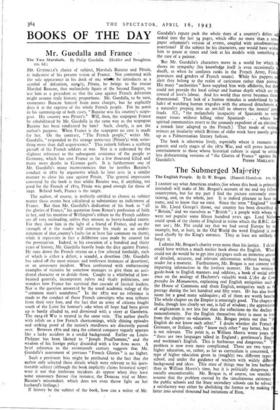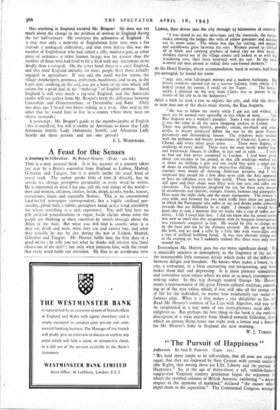The Submerged Majority
The English People. By D. W. Brogan. (Hamish Hamilton.
I CANNOT say what American readers (for whom this book is primari intended) will make of Mr. Brogan's account of me and my fellow countrymen, but for my part I find the picture extremely enter raining, and, on the whole, just. It is indeed pleasant to hear name, and to know that we exist. since the term " England " stu in Mr. Lloyd George's throat, our country has been described " Britain," and we ourselves as " British " ; a people with whom a were not popular some fifteen hundred years ago. Lord Nel could speak of the claims of England in terms which the B.B.C. d not use ; Mr. Pitt could say that we had saved Europe by o example, but, at least, in the Old World the word England is n used chiefly by the King's enemies. They at least are unlikely forget it.
I admire Mr. Brogan's charity even more than his justice. I think could have written a much nastier book about the English. What could not do would be to get into 25zspages such an immense amo of detailed, accurate, and relevant information without boring reader for a moment. Furthermore, Mr. Brogan is not content w imparting information in the liveliest manner. He has written guide-book to English manners and oddities, a book of social re ence on the analogy of Hachette's valuable work L'Art de C prendre les Monuments, explaining real English antiquities such the House of Commons and sham English, antiquities such as t peerage during the last hundred and fifty years. Ht has also fou room for a good many soliloquies ; all of them are worth heart The whole chapter on the Empire is amazingly good. The chapter India, though less clearly set out, is full of wisdom ; the appreciat of anglicanism is not less fair than the reflections on the decline nonconformity. For the English themselves there is most to le from the chapter on •education. Mr. Brogan points out that " English do not know each other." I doubt whether the French Germans, or Italians, really " know each other " any better, but is not relevant. The point is, as William Morris wrote years " there are two languages talked in England ; gentleman's Engli and workman's English. This is barbarous and dangerous." problem is now even more complicated. There are two types higher education, or, rather, as far as curriculum is concerned, type of higher education given in (roughly) two different types school, and under the guidance of teachers with widely differ background and ideas. This state of things may be less barbar than in William Morris's time, but it is politically dangerous a socially uncomfortable. Mr. Brogan is, of course, too sensible assume that the problem created by the simultaneous existence the public schools and the State secondary schools can be solved a satisfactory way either by abolishing the former or by making latter into several thousand bad imitations of Eton.
Has anything in England escaped Mr. Brogan? He does not say much about the change in the position of women in England during the last half-century. He overrates the urbanness of England. It is true that only a minority of Englishmen have ever seen a fox (outside a zoological collection), and that even before this war the number of Englishmen who had aimed a rifle, machine-gun, or other piece of ordnance at other human beings was tar greater than the number of those who had tried to hit a bird with any .nstrument more deadly than a catapult. On the other hand these is a rural England, and this rural England includes far more people than those actually engaged in agriculture. If you add the small market towns, the village shopkeepers, postmen, craftsmen, busdrivers, and so on, to the 6 per cent. working on the soil, you get a body of op nion which still counts for a good deal in the " make-up " of English opinion. Rural England is still very much a regional England, and the American reader will not gather from Mr. Brogan's book the difference between Lancashire and Gloucestershire, or Devonshire and Kent. (Only two days ago I heard two fitters talking in a train. One said to the other that he would hate to live in a county where there were no cherry orchards.)
A postscript : Mr. Brogan's guide to the mumbo-jumbo of English titles is excellent, but will it enable an American to know that Lady Athanasia Seattle, Lady (Athanasia) Seattle, and Athanasia Lady Seattle are three persons and not one person?
E. L. WOODWARD.



























 Previous page
Previous page